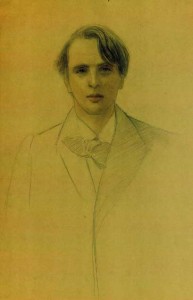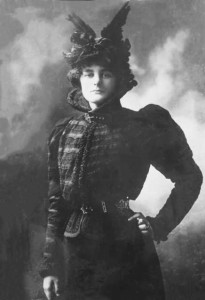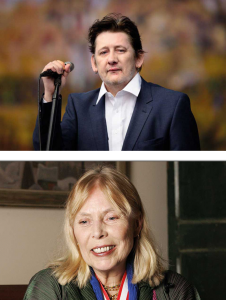W.B. Yeats: sex, death and the state of the nation
Published in Issue 1 (January/February 2016), Reviews, Volume 24W.B. Yeats: sex, death and the state of the nation
By John Gibney

A sketch of W.B. Yeats by Maude Gonne. (NLI)
Last year marked the 150th anniversary of the birth of the poet and playwright William Butler Yeats. While it might not have been a centenary, the immense stature of Yeats in the Irish literary tradition ensured that the anniversary became the ‘hook’ for the ambitious ‘Yeats 150’ programme. W.B. Yeats: sex, death and the state of the nation was RTÉ Radio 1’s major contribution to the commemoration: an enormously ambitious and engaging series that might, on the face of it, seem resolutely uncommercial but which stood as a salutary reminder that public service broadcasting is not, and should not be, about little more than greasy tills.
The series took the form of three discussions anchored by John Kelly and engaged in by a wide range of contributors, interspersed with some carefully chosen and often striking interpretations of key works by Yeats by figures as diverse as Shane McGowan (An Irish airman foresees his death) and Joni Mitchell (The second coming). The key to the structure lay in the title of the series, as each episode focused on a particular aspect of Yeats’s life and career: his relationships with the women in his life (‘sex’), his interest in the occult (‘death’) and his enduring relevance as a commentator on Irish affairs in general and the Irish Revolution in particular (‘the state of the nation’). This was far more than just a biography in the form of a radio documentary; indeed, to a certain extent it threw the listener in at the deep end by dispensing with any sort of potted biography of the early life of its subject. It is an understandable decision to make, for if there is one poet with whom Irish people can be assumed to be familiar it is Yeats. This is due not so much to any innate appreciation for literature as to the presence of Yeats on the Leaving Cert curriculum since 1969: a certain degree of knowledge could be assumed.

Maude Gonne—the choice of his relationship with her as a ‘hook’ in the first episode (‘sex’) made perfect sense.
In that sense, the choice of his relations with Maud Gonne as a ‘hook’ in the first episode made perfect sense. From there it explored (with the aid of Roy Foster, amongst others) Yeats’s relationships with women as diverse as Olivia Shakespear and Augusta Gregory. Such relationships were of fundamental importance to both his personal and his public life. Yeats’s famous ‘no petty people’ speech, delivered in the Senate in the 1920s, explicitly saw him place himself within an Anglo-Irish tradition that he implied, and others assumed, to be that of the ‘Ascendancy’. Yet Yeats himself stemmed from the Protestant middle classes of Sligo, and his recasting of himself in a new mould was influenced in large part by his long friendship with Gregory and his frequent sojourns on her estate at Coole Park, outside Gort. It is difficult to fully divide Yeats’s life into compartments—his association with Gregory was also integral to his involvement in the Abbey Theatre—and to its credit the series did not attempt to impose an undue demarcation between the themes that it chose to emphasise.
Yeats’s interest in the occult was first engaged when he was in his twenties, with his involvement in the Order of the Golden Dawn (and may well have been influenced by the mysticism and ritualism to be found in his maternal family, populated as it was by Freemasons and Orangemen). As Paula Meehan argued in the second episode, however, Yeats’s mysticism may well be a key reason why his poetry remains so popular: that even aside from his talent, and the specificity of his subjects, his work retained a universal appeal that was inextricably linked to the search for universal truths implied by his interest in the occult. This was especially pertinent given the subject of the third episode: Yeats’s relationship with Ireland itself.

Figures as diverse as Shane McGowan (An Irish airman foresees his death) and Joni Mitchell (The second coming) provided some striking interpretations.
This is easily the most familiar of the three elements of Yeats’s life with which the series dealt; shrewdly, it was left until the end. Easter 1916 is the most famous (and most quoted) of a string of extraordinary poetic commentaries on Irish and international affairs (such as Nineteen hundred and nineteen and Meditations in time of Civil War). Yet Easter 1916 marked a re-engagement with Ireland by a man on the cusp of 50 who lived in London and whose enormously ambitious attempt to reassert Ireland as an imaginative centre that could challenge the imperial metropolis of London (an issue teased out here by P.J. Mathews and Fintan O’Toole) seemed, by 1916, to have been receding into the recent past. One might argue that by attempting to reinsert himself into the mainstream of Irish events Yeats displayed an extraordinary cynicism—witness his recasting and depoliticising of the life of Augusta Gregory’s son Robert in An Irish airman foresees his death, or the self-serving question ‘did that play of mine send out certain men the English shot’ (it didn’t). One might also add his treatment of Seán O’Casey’s The silver tassie to the list, as Yeats played his own part in glossing over the Irish involvement in the First World War. This episode was not dealt with here, but that is hardly a quibble, as so much else was addressed over the course of this series; W.B. Yeats led a protean life, and one could easily justify at least another three episodes.
Presented in an informed but relaxed style by Kelly and produced by Siobhán Mannion, the deceptive simplicity of the discussion format belies the penetrating manner in which this series explored Yeats’s life and, by extension, the Ireland of his time. W.B. Yeats: sex, death and the state of the nation was an excellent and illuminating series that cast new and often unfamiliar light on this most familiar of Irish poets; it remains available to listen to at http://www.rte.ie/radio1/wb-yeats/.
John Gibney is editor of www.decadeofcentenaries.com.
















